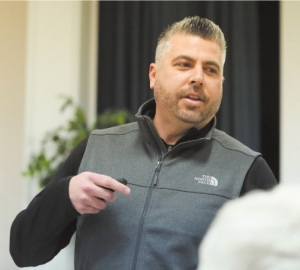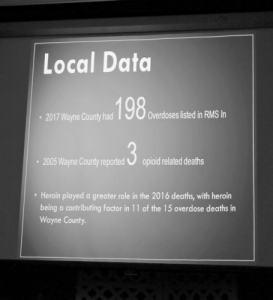Task force officer talks dangers of opioids
By Steve Herring
Published in News on January 31, 2018 5:50 AM

News-Argus/CASEY MOZINGO
Matt Miller with the Wayne County Sheriff's Office makes a presentation about the opioid crisis during the Mental Health Association in Wayne County's annual dinner meeting Tuesday night at St. Luke.

News-Argus/CASEY MOZINGO
Recent statistics are displayed on a projector as Miller talks about what is being done locally to help with the opioid crisis. He also had a slide with terminology and solutions that ranged from Narcan to drug rehabilitation.
There were 198 drug overdoses, primarily opioid related, in Wayne County in 2017.
"That is one every other day," said First Sgt. Matt Miller, ATF task force officer with the Wayne County Sheriff's Office.
In 2005 three opioid-related deaths were reported in the county -- a number that jumped to nine in 2015, he said.
Miller spoke about the opioid and heroin crisis Wednesday night during the annual membership meeting of the Mental Health Association in Wayne County held at St. Luke United Methodist Church.
Miller used videos shot in Boston and Baltimore to provide a perspective on the drug crisis from both the dealers and the users.
In one video, a Baltimore drug dealer said that if the heroin did not have fentanyl in it that he didn't want it.
Fentanyl is a synthetic opioid that is 50 times more powerful than heroin, Miller said.
The drug dealer in the video said that the more the mixture of heroin and fentanyl kills, the more the users chase it.
And the more that happens, the more money the dealer makes, the dealer said.
"That is one of the things that I had to learn and understand when it comes to working this kind of narcotic," Miller said. "You say to yourself, obviously they (users) don't want to die. You'd think once that dope hits the street and everybody learns that dope is killing their friends or someone in their circles that they would flee from that.
"It is the exact opposite. They want that dope that will knock them out. They want the dope that will just about kill them because they believe, not that they want to die, that they can mix it a little better. They believe their body has a better tolerance or whatever they believe. They tell themselves that they actually want that dope to get a better high. That is what they are after."
That is crazy, Miller said.
Miller said that as an investigator on the street it was something he had not subscribed to fully at first.
"That is the way these guys see it," Miller said.
How can something such as that be combated, he said.
How does Wayne County compare in terms of drug use, he said.
It is here, just on a smaller scale, Miller said. Wayne County is somewhere in the middle, he said.
Wilmington is No. 4 in the nation for heroin overdoses, Miller said, but if you consider the opioid overdoses they are actually No. 1.
Miller said Wayne County Sheriff Larry Pierce has deputies focused to go after drug dealers.
"If somebody dies from dope, let's go after (drug dealers) and prosecute them for killing them, instead of 'I hate that for them,'" he said. "We are actually going to try and take an aggressive stance on doing that. We have actually been successful in making some cases we presented to (District Attorney) Mr. (Matt) Delbridge."
One problem is the ready availability of opioid painkillers such as hydrocodone.
The pills take control of a person, he said. The pills become a gateway to other drugs such as heroin, he said.
Miller said he recently went to a doctor after hurting his leg.
The doctor asked Miller how many hydrocodone pills he wanted. Miller told him he did not want any, but the doctor argued for them.
Miller said he had spoken to legislators about making pseudoephedrine (used in meth) a controlled substance narcotic because that would almost destroy meth labs.
"Then I saw these great big old, nice, fancy lawyer teams pop up from the pharmaceutical companies and just basically take everything we knew to be true and factual and just smoke and mirror," he said. "They just destroyed it.
"So I have seen that. I have been a part of it."
The county has the supply and demand for drugs, but why do people need them, said Emily Peacock with the Association.
"That is when we talk about mental health," she said. "How do we make people healthy enough that they don't have to reach for other ways to get that high."
